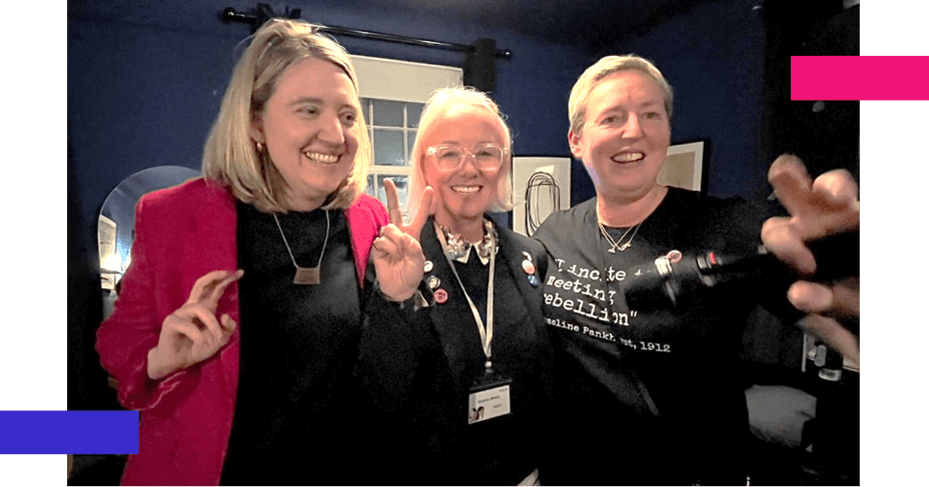At our recent ‘How Did She Get There?’ launch evening, we were joined by our research author Jane Sassienie, BRIDGE Director, alongside research participants Sophie Neary, Group Director UK&I, Meta and host of the Courage is Contagious podcast and Georgia Gould, Leader of Camden Council. These amazing women shared their insights and the personal stories that have been resonating the loudest for them since launching the research.
Jane started by naming the part that organisations and the leaders in them, can play to make change towards equality for women where government isn’t. She talked about the need to end the taboos around women in organisations (highlighting Sophie Neary’s activism at Meta) and break down the barriers that prevent women being who they are.
Sophie highlighted this when she spoke:
“What we need to do is to be loud about how we fight the blistering inequality and inequity that still exists in this world today. Far too many of us have had to learn that this lottery of our gender, and our circumstances of our birth have such a significant impact on our chances of success in life, because until we recognise that life is different for women and we have different needs, we are never going to be able to provide equity in society.”
The biggest message Jane wanted to land from the research was that women don’t need fixing to be fit for powerful roles in society or organisations. We must allow women to go with who they are and stop trying to fit. Let’s change the organisations rather than being changed by them.
Jane highlighted that organisations reward people, not just women, for a very narrow band of behaviour.
People are dropping all kinds of differences as they go into their organisational doors; and we need all of that difference, all of that complexity, to solve the challenges of today.
We need to stop changing everyone as they come in, and we need to create organisations that allow people to be who they are.
Jane shared a recent client experience:
“I had a conversation recently with one of our clients, an incredible male leader. We were talking about the alpha male culture, and he said ‘well, I’m an alpha male’. Fortunately, my doorbell rang at that point, and I thought, ‘I can’t tell him he’s not an alpha male’. I went to the door, said thank you to the DHL man, came back, and luckily it occurred to me on my way back to the screen that, yes, he is an alpha male, but he’s also a lot more. Alpha male is right at the heart of what we reward people for in dominance cultures. People like him have that and use it when they need it. But he also has so much more. He has so much more range. I was able to say, ‘well, yes, you are an alpha male, but you’re also so much more’.
Sophie Neary started by thanking Jane for doing the research and being the voice of change, quoting Maya Angelou: ‘when a woman stands up for herself without knowing it, she stands up for all women’.
Her key message was that women (and other underrepresented people) have to be seen before they can make great things happen. A lot of women don’t feel seen, and you cannot be what you cannot see. However, when women or any underrepresented person, feels seen truly great things can happen.
Sophie shared how a lot of her activism comes from the facts around inequality, it is still too hard for women to do well in this world:
“When I was a little girl, my dad used to say to me, ‘Sophie, you can do anything you want to, anything at all, as long as you understand that it’s harder for girls. You’ll have to be twice as good and work twice as hard to be seen the same’. When I said to him, ‘but I don’t understand why, that is just so unfair’, he told me the inconvenient truth. ‘Life is unfair, Sophie. It is harder for girls.’”
“I posted on LinkedIn about the gender pay gap. It was at the time when Meta had laid off 11,000 people, and I was really worried about the impact that was going to have, because it takes women longer to find a job. If you’re a black or brown woman, it takes you even longer to find a job. What I hadn’t expected to happen was that I would get trolled by thousands of men on LinkedIn telling me that the gender pay gap was a myth and that it didn’t exist. Last year, on average in the UK, women earned £568 per month less than men. That’s nearly £7,000 every year. That is a fact.”
“Warren Buffett was once asked the reason for his success. He very boldly and courageously said, ‘I’ve only ever had to compete with half the population,’ I would never have thought that Warren Buffett would necessarily be an ally for women. It’s true, isn’t it? I don’t think there is a single scientific fact or study that says that men are better lawyers, leaders, presidents, prime ministers, scientists, doctors than women are. Yet, if you look at who sits in all of those roles, in society, in government, in organisations, it’s men. Women are 51% of the population, but we aren’t 51% of any of those roles. We either have to accept that the system is fundamentally broken, (so we want a revolution, not an evolution), or we accept that men are better than women, at all of these things. I’m pretty sure that there is no scientific study that says that men are. So, we need to fix the system.”
Sophie also highlighted how talent is equally distributed but how opportunity is not. Until we recognise that life is different for women, and we have different needs we are not going to be able to provide equity for women.
“Parliament in the UK made a shocking decision to not assign menopause as a protected characteristic this week. They gave the reason that they were worried it was going to cause discrimination against men. As we know, the whole point about the Equality Act is to protect the underrepresented, not to reinforce the privileged.”
“I joke all the time that if men had periods, we’d have two days off every single month, and period products would have been free for everyone, forever. If men had the menopause, we’d all get a gap year when we’re 50 and HRT would be as common as popping a Nurofen.”
“Hands up anyone who’s ever hidden a tampon up their sleeve whilst going to the loo in the office. Every single person on this planet is born as the result of a period. We’re made to feel so ashamed that they even exist. So much so that we now have rustle free tampon wrappers. I mean, how is that a thing? That’s just unbelievable. Whether it’s periods and difficult things like baby loss, IVF, smear tests, mammograms, they all happen during working hours. I know so many colleagues who’ve had miscarriages at work, but they haven’t even dared tell their colleagues or their managers because they didn’t want people to know that they were trying to get pregnant.”
Organisations need to ensure that these needs are recognised for all women, and it can’t drag on like equal pay has. It can’t be a woman versus man debate either. Sophie’s wish is that more male leaders could open up and recognise their privilege. Courage is contagious so the more of us that speak up the more this will build courage in others to do so.

Jane introduced Georgia as someone who has really stepped into a crucial part of this journey –partnership. Not just partnership within the organisation, but also in the community, with their families, and with women. Inequality will be solved through partnering across these systems and working out, what do we need to do so that everyone can thrive?
Georgia spoke about what is required for women to thrive, describing women who are thriving and the way they bring their whole selves into their leadership and talk openly about the realities of women’s needs. It’s a myth that changing the structure holds men back, in many ways enables men to thrive:
“We went from an organisation where people wouldn’t discuss some of the issues you talked about Sophie, to one where our staff are really proud to get up and talk about their experience with the menopause and talk about the challenges they face. We had one of those sessions recently where we had lots of brave testimony about some of the kind of experiences people had. There was an older guy who came up to me afterwards. He wanted to have a chat with me. I was feeling a bit nervous because I thought maybe he’s going to say, why are we not talking about white men? Or ignoring them? He sat down and burst into tears, and he said, my wife has been asking me for a long time to get therapy because of how I’m relating to my daughters, but I’ve been scared to do that. Because of what I’ve heard today, I feel really freed and I’m going to tell her that she’s right and I’m going to do it. I just thought how powerful that he could then bring himself to work and felt unlocked by this”
Georgia explained her mission to transform Camden Council – opening it up to partnership across the team, the London boroughs and with the community. Over time we are seeing significant changes:
“We recently had the Treasury visit us because we have an outstanding children’s services and we’re one of the only councils in the country that are seeing reduced demand. They came in and asked to see how we had done this; they were expecting an amazing spreadsheet or a clever outsourcing strategy. They had a look of dismay when what we had for them was a story about love. Our staff say to love is to act in partnership, to work with deep collaboration, show care and kindness and to recognise the power of community. It is really changing things”.
“When the pandemic hit it created many challenges across London and initially, they tried to resolve it through being directive. Through the London council (all four parties) which I chair, we recognised the need to collaborate deeply (all four of us being women), working in a relational way across all our communities and it enabled us to respond well to the crisis. I truly believe that there’s not many problems you can’t solve if you get the right people in the room with a strong sense of shared purpose. It is the other guiding light for me, my purpose. If I really think about what my purpose is, who am I trying to serve who am I trying to speak for then it all really starts to flow.’

What really changed Georgia’s understanding of leadership was Grenfell:
“When I first became leader of Camden it was just after Grenfell and we found out that one of our big housing estates, five big towers, had the same cladding as Grenfell. The fire brigade said to us that it wasn’t safe for people to stay in those properties overnight and we had to make a really difficult decision to evacuate those residents. I remember the head of my press team said, ‘but there’s press outside (Sky, BBC and Channel Four) you’ve got to go out and make a statement’. I just viscerally remember standing there and thinking, I could run, I could try to run. Because there was no time to prepare or check the right messaging, I realised I just had to speak from the heart. The media just kind of followed me around as I dealt with incredibly distressed and upset residents. At the end of that, I got thousands of emails (some not so kind) but the majority were wonderful emails saying it was really refreshing to see such an empathetic approach, and you were so kind, and it was great that you were out there. I was really shocked by it because I thought that this is what you do, you get out in the community listening to people. It just made me realise that sometimes you spend so much time trying to step into an image of what a strong leader looks like or a professional, speaking the right way or making a great point, but actually, people want kindness. They want compassion and they want to see people that turn up and are human. For me, that was most powerful when I was being most myself. I think I’ve tried to take that into the things I do now and recognise the real courage that comes with compassion and kindness. That’s the revolution we need. If we took those values as a way to rebuild politics and business, I think we would have a much better world for all of us to thrive.”
Jane summarised all the key messages from the evening by sharing her perspective on the leadership needed now. BRIDGE define leadership as when leaders’ consciousness of what needs to change connects with their courage to act, which is courageous activism. If you are conscious of what needs to change, but don’t act then you are just spectating, which is what we see a lot on issues of inequality. So, we really want to support all leaders and organisations with having the courage to act.
Jane ended the evening by inviting all leaders to become part of the gentle rebellion, inciting the room to rebellion, but a different type of rebellion; not berating or making people wrong but tackling this in partnership and courageously experimenting around what it may take in your organisations to make a change, so that all women thrive.
To download a copy of the paper and to access powerful recommendations that organisations can apply to enable more women to thrive click here.


